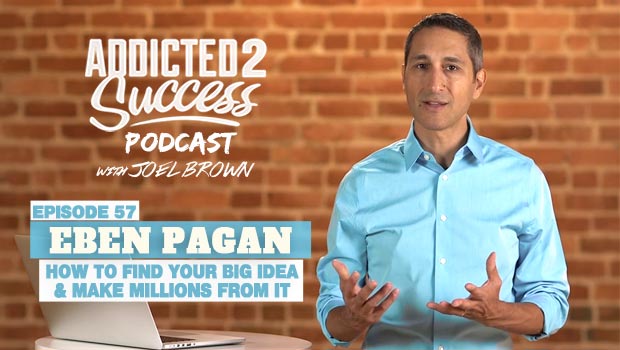Startups
The 5 “Must-Have” Checklist For Building A Successful Digital Product Business
Over the past 15 years, I’ve developed a set of proven, systematic shortcuts that you can take in order to create and launch your digital product, so it becomes a winner for you, your business, and your income.
I call the set of shortcuts, and the training program that teaches them to you, the “Digital Product Blueprint” – and we start class for it very soon.
Right now, I’m going to show you some of the shortcuts I’ve learned in the form of 5 checklists that you can use immediately to start or build your digital product business…
1. The Niche Checklist
Targeting the right niche (or audience) is one of the most important factors to your business success.
Because when you get your audience right, then you know who they are in your mind, how to talk to them, and what to say to connect with and persuade them to buy.
If you don’t get your audience right, then you’re continually guessing, and you’ll probably create a product that NO ONE WANTS TO BUY.
Here’s the checklist I use whenever I target a new niche:
1) Narrow Your Niche – Don’t try to create a product that appeals to everyone. Get specific in order to create a product people really want to buy.
2) Use my 3 Question Test – Is your target customer motivated? Are they actively searching for a solution? Are they having a hard time finding the right answer?
3) Create A Category – Think in terms of categories, and create your own. My category was to help men get dates.
4) Name Your Category – Example: “Dating Advice For Men.”
5) Create Your Customer Avatar – Put all the traits together, and create one person in your mind. Give them a name.
2. The Product Checklist
As you make your product, it’s important to remember that you can make a digital product that actually does most of the heavy lifting of the sales and marketing for you.
You can create a product that people are already searching for, that they already want to buy. And you can do this relatively easily and quickly.
Here’s my checklist for creating a product that sells itself:
1) Create an outline based on the things that people are searching for. If you base your outline on what people are searching for, then you have something that people already want to buy.
2) Get a rapid prototype together of your digital product and start testing on the market. It doesn’t have to be perfect because you’re going to refine it based off actual feedback from your customers.
3) Use Knowledge Frameworks (proven formulas for effectively teaching or delivering content). I use a total of 7 different knowledge frameworks, so it’s super fast and easy to create quality content for my products.
4) Package your knowledge in the highest-value format you can. There are many types of digital products, with books, audio courses, video courses, membership sites being just a few of them.
5) Name your product correctly. Tip: Use the most important benefit or outcome or result that your customer wants or wants to avoid.
3. The Marketing Checklist
We all intuitively know that marketing is a key to our online business success, but we’re often afraid of it because we don’t want to turn people off with a bunch of high-pressure, inauthentic, scammy-sounding salesman talk.
It doesn’t have to be that way. There is a way to create marketing that is not only ethical and feels natural, but also grabs attentions and persuades people to buy…
Here’s a checklist I use for my marketing:
1) Test everything. Treat everything you do as a test and continue refining until you have a consistent winner.
2) Use the 7 Step Conversion Conversation:
Headline: Start the conversation by saying their biggest need.
Story: Tell the story of how you learned to get the result they want.
Product: Introduce your digital product as the solution itself.
Bullets: Talk about the list of benefits or results they’ll get with your digital product.
Value: Frame and translate the value in their language.
Risk Reversal: Take the risk away by offering a guarantee.
Action: Ask them to take action, and tell them what to do right now to take the first step toward getting the result they want.
3) Use winning, proven, money-making headline and copy formulas.
When in doubt, start with the words “How To…”
I use 7 key headline formulas and a set of copy and bullet formulas, which you’ll be seeing in future sessions and advanced trainings in Digital Product Blueprint.
4) Speak it out loud
Say your marketing and use a transcription of your words to keep that “conversational feel.” Speak-write. It’s OK, and very welcome in marketing.
5) Make your marketing feel like valuable education and news. Design is a big deal. You want your marketing to feel intuitively trustworthy, so make sure you design your pages and communications to feel like valuable education and news.
4. The Launch Checklist
Your launch gets your digital product out into the world, and it gets your online business off the ground and running.
Here’s a checklist of things to remember for your launch..
1) Move The Free Line – It used to cost a lot to give away a really valuable piece of education or training. Now it doesn’t. Give away something as valuable as what other people are charging for, to separate yourself from the pack.
2) Treat your prospects like customers from the beginning – Actually start your digital product experience in your free content as you do your launch.
3) Offer to give content and training to future partners. Guest blog, guest interview, guest webinar… guest content however they want it.
4) Put up an opt-in page for your launch. Most people won’t buy the first time they see your offer. Get their email and contact info so you can follow-up with them.
5) Give students a powerful reason to enroll now. It’s human nature to procrastinate, so make sure you provide a real and compelling reason for people to act now.
5. The Email Checklist
Email was and is the “killer marketing app” online. Most sales of digital products in our industry are made by email. True story.
Yet, this is where a lot of people who create digital products drop the ball, and they throw away 80 or 90% of their sales and money as a result.
Here’s a checklist I use for creating my emails:
1) Start your email with something valuable — even if it’s a little tip or story about how you got an insight. And start your subject line with something that grabs attention.
2) Align everything – Make sure that the subject, body, and offer are all about the SAME THING.
3) Keep following up – You can’t over-communicate if you’re talking to people who are interested in your topic and you’re always giving them valuable information.
4) Vary Your Format – Keep things fresh and engaging for your audience by sending them different types of content (articles, videos, podcasts, etc).
5) Make several offers – Make sure your emails contain at least TWO offers with working links, clickable pictures, or other ways to respond and take action.
There you have it.
We just covered all 5 foundational components of a successful digital products business.
But we’re just barely scratching the surface here…
If you enjoyed this post, and you’d like even more in-depth training like it, then be sure to check out my upcoming new course called “Digital Product Blueprint”.
This is a new 90 day program, where you’ll get my complete set of proven templates, systems and blueprints for building your digital product and online business from scratch.
Click The Banner Below for My Free Video Training Course:

Shift Your Mindset
10 Powerful Traits Every True Thought Leader Possesses
In a world saturated with noise, thought leadership is the quiet power that shifts paradigms.

Thought leadership is more than just having strong opinions. It’s the ability to influence, inspire, and guide others by sharing original insights, innovative ideas, and deep domain expertise. It’s about sparking change, not just talking about it. (more…)
Startups
The Young Man’s Guide to Creativity: 10 Daily Habits to Improve Your Creative Mind
10 daily habits you can put into practice right now to improve your creativity

When I was 22 years old, I became a Top Writer on Medium.
It’s not an easy path. I lived in the Philippines and had never received a penny after writing over 100 digital articles. But I treated it like practice. If I couldn’t get other people to read my work for free, why would they trust me? (more…)
Startups
If You’re Not Reinventing Yourself, You’re Falling Behind! Here’s What To Do
Reinvention is the secret weapon of high performers.

Reinvention is the secret weapon of high performers.
Most careers follow a predictable script. You start at the bottom, climb the ranks, and eventually settle into something resembling stability. But the people who make the biggest impact, the ones who don’t just play the game but change it, break that script. They evolve. They shift. They reinvent. (more…)
Startups
The Silent Killer of Startups: This Might Be Draining Your Profits
If you are careless in managing your inventory, it can lead to a sudden depletion in cash flow

There are several issues in a startup, but if you are really careless in managing your inventory, it can lead to a sudden depletion in cash flow. Old, broken, and misplaced stock wastes space and profits. If inventories and storage aren’t managed properly, it hardly ever works.
-

 News3 weeks ago
News3 weeks agoBrandon Willington Builds 7-Figure Business by Ignoring Almost Everything
-

 Health & Fitness4 weeks ago
Health & Fitness4 weeks agoWhat Minimalism Actually Means for Your Wellness Choices
-

 Did You Know3 weeks ago
Did You Know3 weeks agoWhy Most Online Courses Fail and How to Fix Them
-

 Business4 weeks ago
Business4 weeks agoIf Your Business Internet Keeps Letting You Down, Read This
-

 Business2 weeks ago
Business2 weeks agoEntrepreneur’s Guide to Pay Stubs: Why Freelancers and Small Business Owners Need a Smart Generator
-

 Business2 weeks ago
Business2 weeks agoThe Salary Shift Giving UK Employers An Unexpected Edge
-

 Scale Your Business2 weeks ago
Scale Your Business2 weeks ago5 Real Ways to Grow Your User Base Fast
-

 Business2 weeks ago
Business2 weeks agoThe Simple Security Stack Every Online Business Needs

























